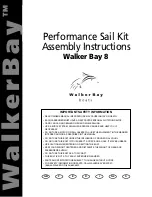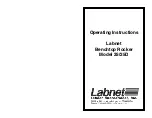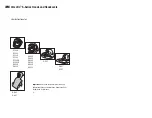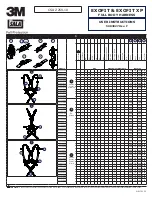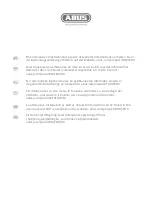
142
Electromagnetic Compatibility Information
Table 1
Guidance and manufacture’s declaration – electromagnetic emissions
The EM 49 is intended for use in the electromagnetic environment specified below.
The customer or the user of the EM 49 should assure that it is used in such an environment.
Emissions test
Compliance
Electromagnetic environment – guidance
RF emissions CISPR 11
Group 1
The EM 49 uses RF energy only for its internal function. Therefore, its RF emissions are very low and are not
likely to cause any interference in nearby electronic equipment.
RF emissions CISPR 11
Class B
The EM 49 is suitable for use in all establishments, including domestic establishments and those directly
connected to the public low-voltage power supply network that supplies buildings used for domestic
purposes.
Harmonic emissions IEC 61000-3-2
Not applicable
Voltage fluctuations/flicker emissions
IEC 61000-3-3
Not applicable
Table 2
Guidance and manufacturer’s declaration – electromagnetic immunity
The EM 49 is intended for use in the electromagnetic environment specified below. The customer or the user of the EM 49 should assure that it is used in such an
environment.
IMMUNITY
test
IEC 60601
test level
Compliance
level
Electromagnetic environment – guidance
Conducted RF
IEC 61000-4-6
Radiated RF
IEC 61000-4-3
3 V
rms
150 kHz to
80 MHz
3 V/m
80 MHz to
2,5 GHz
3 V
3 V/m
Portable and mobile RF communications equipment should be used no closer to any part of the EM 49, including cables,
than the recommended separation distance calculated from the equation applicable to the frequency of the transmitter.
Recommended separation distance:
3V
d
= 1,2
80 MHz to 800 MHz
d
= 2,3
800 MHz to 2,5 GHz
Where
P
is the maximum output power rating of the transmitter in watts (W) according to the transmitter manufacturer and
d
is the recommended separation distance in meters (m).
Field strengths from fixed RF transmitters, as determined by an electromagnetic site survey,
a
should be less than the
compliance level in each frequency range.
b
Interference may occur in the vicinity of equipment marked with the following symbol:
NOTE 1
At 80 MHz and 800 MHz, the higher frequency range applies.
NOTE 2
These guidelines may not apply in all situations. Electromagnetic propagation is affected by absorption and reflection from structures, objects and people.
a
Field strengths from fixed transmitters, such as base stations for radio (cellular/cordless) telephones and land mobile radios, amateur radio, AM and FM radio broadcast
and TV broadcast cannot be predicted theoretically with accuracy. To assess the electromagnetic environment due to fixed RF transmitters, an electromagnetic site survey
should be considered. If the measured field strength in the location in which the EM 49 is used exceeds the applicable RF compliance level above, the EM 49 should be
observed to verify normal operation. If abnormal performance is observed, additional measures may be necessary, such as re-orienting or relocating the EM 49.
b
Over the frequency range 150 kHz to 80 MHz, field strengths should be less than 3 V/m.


















